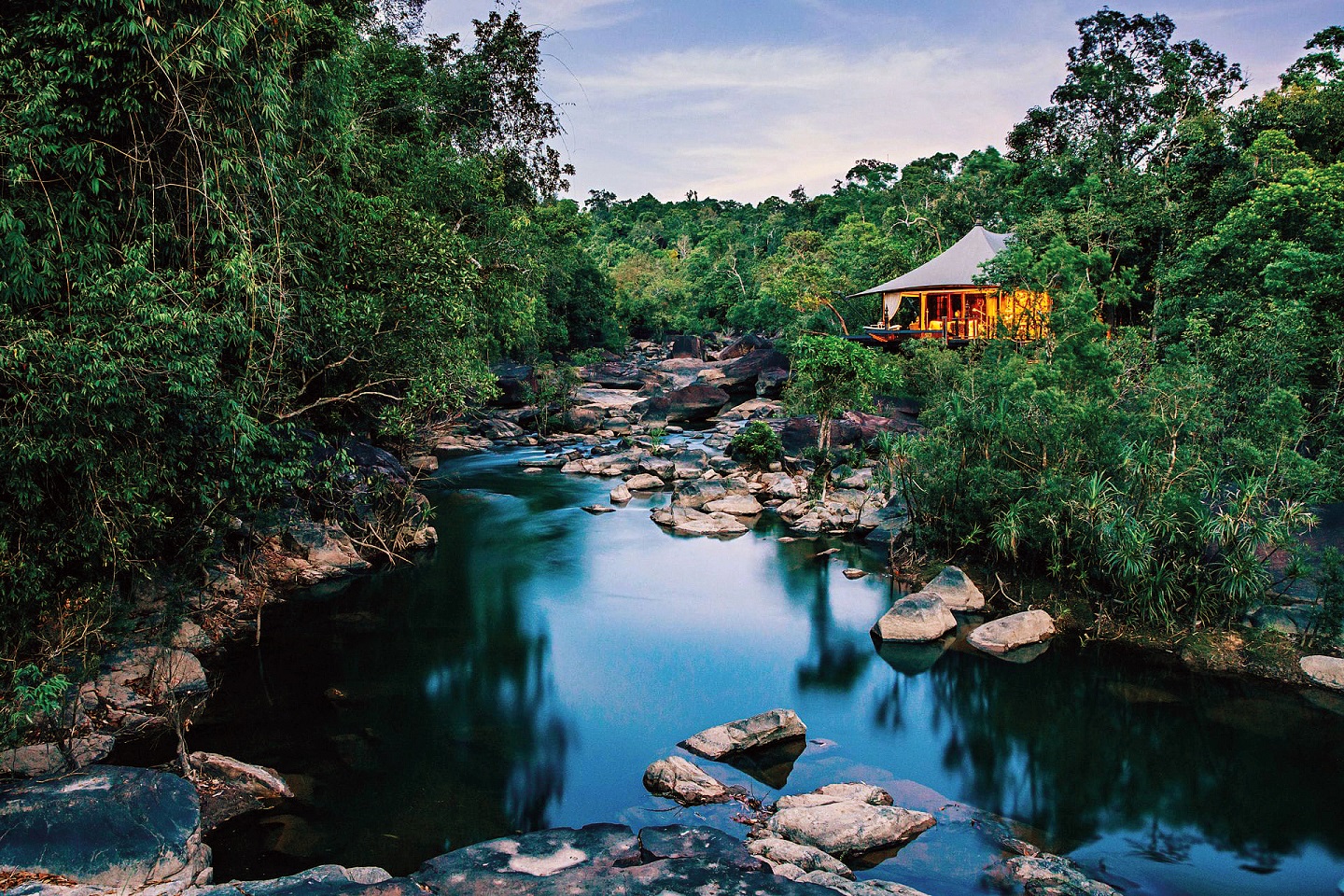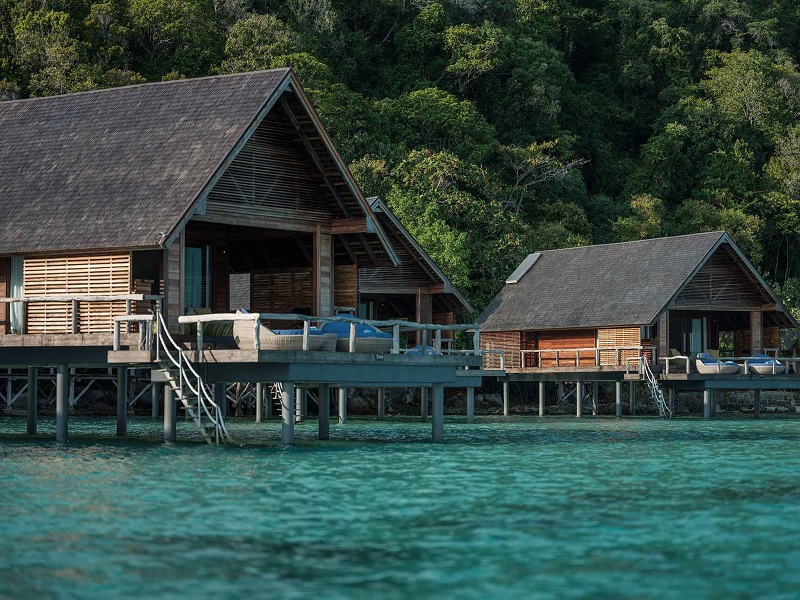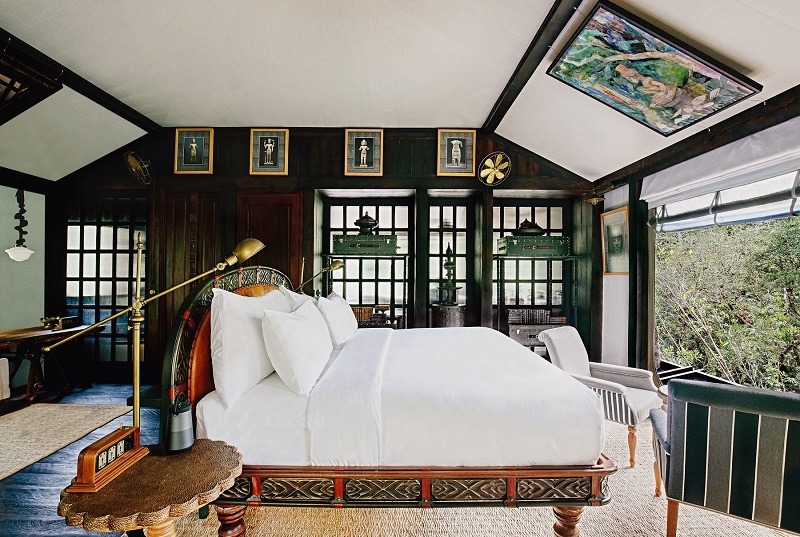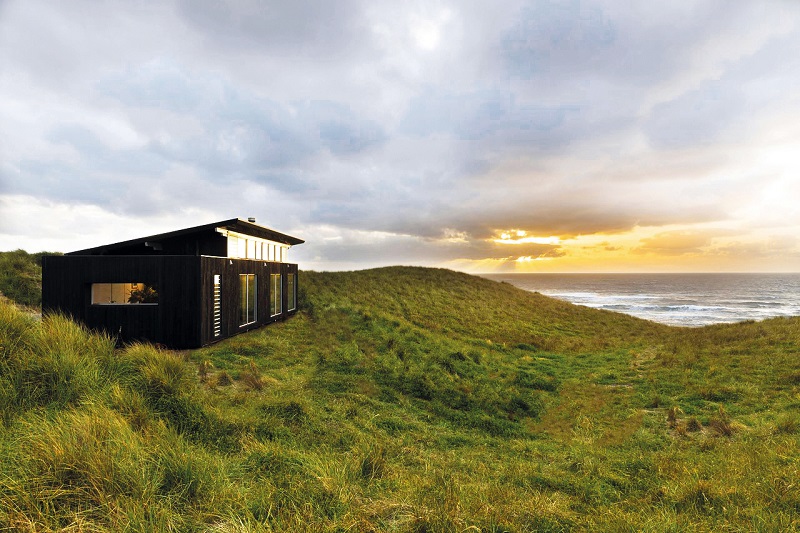
Shinta Mani Wild is an incredible eco-conscious hideaway in Cambodia (Photo: Shinta Mani Wild)
Seeing life through green-tinted glasses is now all-important for the hospitality industry which is experiencing a tremendous rebound after being pollarded by the pandemic. But as much as energy conservation, recycling and other sustainable best practices are adopted, the ultimate deal clincher remains the property itself. Here are some suggestions for gentle-on-the-planet hotels and resorts that tick every single box on your next earth-aware holiday checklist. Easy does it then.
Where: Due to its remote location in the Anambas archipelago, getting to Bawah Reserve is only possible by seaplane, which takes off from Hang Nadim Airport in Batam, Indonesia. Due to its exclusivity, it might put your mind at ease to know that if you travel via Singapore, the journey begins with a chauffeur pick-up from residence, hotel or airport, after which you will be escorted by a dedicated travel coordinator by ferry and car to the Batam airport before boarding an 80-minute flight to Bawah Reserve. Other possible starting points include Jakarta and Bali.
What: Located on a spectacular private island, Bawah operates under a strict earth-first philosophy with a minimal-impact building code. Even the initial approach is spectacular, from the seaplane landing to arriving at the resort’s jetty, built above a coral reef straddling two lagoons, built with the aid and expertise of a team of specialist divers. The accommodation and F&B offerings are rustic yet soothingly luxe, offering at least four different dining venues and dreamy places to call your home away from home, including overwater bungalows and treetop lodges.
Why: Bawah’s remoteness — there are no other islands closer than 30 nautical miles — equates to a thriving, independent ecosystem that would be a privilege to discover, from the mangroves to bird and marine life and lush tropical jungle. How fitting then that the aim of each Bawah stay is to have guests feel as if they were explorer-botanists embarking on an adventure to a lost island. Historically, French explorer and naval officer, the Baron de Bougainville, was the first European to reach the Anambas Islands, whose logbook was recounted in The Greatest Works of Jules Verne. The Bawah Anambas Foundation was also established in 2018 as an independent, not-for-profit organisation to help conserve and expand the biodiversity of the Anambas Islands through land and marine conservation efforts as well as community welfare projects.
Where: Near Sihanoukville, Cambodia.
What: Acclaimed architect, interior and landscape designer Bill Bensley is the talent behind this incredible eco-conscious hideaway that has to be experienced to be believed. There are just 15 luxuriously-appointed tented suites at this verdant property, nestled at the crossroads of three nature reserves — the Kirirom, Cardomom and Bokor National Parks. Each location was meticulously planned over seven years in order to fully understand the ebb, flow and idiosyncrasies of the river valley. The Shinta Mani Foundation Tent or Tent 3 is, by far, one of the most dramatic — perched on a 25m-wide boulder that disappears completely under white water at the monsoon season’s peak. But if you consider yourself a bit of a water baby, be sure to book Tent 14 or the National Geographic Tent, which is nestled in a rocky gorge at the base of the Raging Middle Sister Falls.
Why: The DNA of Shina Mani Wild actually stems from a 1967 King Sihanouk expedition so it is only natural that the property’s design pays tribute to Mother Earth. The walls are adorned with hand-drawn art which works to create a harmonious and immersive atmosphere while the 33m freshwater cistern-shaped swimming pool, painted jet black in order to reflect the surrounding rainforest, ensures a most rejuvenating dip. Outside, a wide variety of nature-focused activities are literally laid down at your feet, from exploring the nearby estuaries on an expedition pontoon boat to trekking the Cambodian rainforests, whose primary inhabitants include leopard cats, porcupines and wild elephants. Oh, Shinta Mani Wild also operates on an all-inclusive basis — from food and drinks to wellness treatments and adventures. Only helicopter transfers are considered an extra. The resort funds a dedicated Wildlife Alliance ranger station within the camp and also makes it a point to employ as much as 70% of its staff from the local village while single-use plastics — even right up to back-of-house supply chain levels — are completely verboten.
Where: King Island, a short flight from the main island of Tasmania or Melbourne, Australia.
What: If ever you wanted to get away from it all but in eco-conscious style, you need to make your way to the scenic and still-a-secret King Island, a little patch of windswept paradise measuring just 65km long and 25km wide, floating in between mainland Australia and Tasmania. Cheese lovers would invariably be familiar with the island’s name, being the source of the ethereal soft cheese (triple cream version, please) of King Island Brie, while hardcore foodies would know of the thriving local food and arts scene.
Why: Apart from the rugged sea dotted with shipwrecks and coastlines studded with lighthouses, there is also golf, horse riding and the opportunity to indulge in hours of wonderful nature walks and rambles in champagne-like fresh air. Nature lovers would also be thrilled to explore the island’s ancient calcified forest or walk the dramatic coastal cliffs of Seal Rocks. The main choice of accommodation would be Kittawa Lodge, an off-grid luxury two-villa property founded and managed by Aaron Suine and Nick Stead. Everything is gentle on the planet, from bedding down on sustainable bamboo linen sheets to chemical-free cleaning and meals featuring ingredients freshly foraged by Kittawa’s chef. The villas’ owners and locals are also a close-knit crew and Kittawa Lodge is adamant about supporting primarily-locally-owned-and-operated small businesses on the island and across Tasmania. So, if the price of a night’s stay allows you to experience a day in the life (albeit a pampered one) of a King Islander while contributing to the betterment of the community, why ever not?
Where: Savusavu, a one-hour inter-island flight from the international airport in Nadi, Fiji.
What: An award-winning, five-star resort named after a celebrated French oceanographic explorer? Volontiers, s’il vous plait! Set by the gin-clear waters of Savusavu Bay and spread out across 17 lush acres on Vanua Levu, Fiji’s second largest island, this eco-luxe escape combines authentic Fijian warmth with world-class hospitality. Comprising just 25 expansive bures fitted with private patios (all the better to admire the striking sunsets from, my dears), the resort, constructed using certified forest timber, prides itself on accommodating all the best environmental practices, including recycling, composting and solar panel energy. Even the kitchen makes it a point to exclude reef fish and farmed prawns.
Why: Hugely committed to authenticity and sustainability, the resort — along with Jean-Michel Cousteau himself — is a pioneer in involving guests in conservation activities and initiatives. Guests come for an unforgettable vacation, of course, but leave with newfound knowledge and appreciation of Fiji’s precious natural beauty, ensuring what remains may remain safe and untouched for generations to come.
Where: Greater Kruger National Park, South Africa
What: Set within South Africa’s greater Kruger National Park in the Sabi Sands Game Reserve, the 97-year-old Londolozi, whose name means “protector of all living things” in Zulu, is one of the country’s original private game reserves. Apart from its unrivalled and progressive land and wildlife management practices, Londolozi also manages to build a strong bridge between a highly ambitious conservation ethic and exceptionally swish escapism. Its Relais & Châteaux status, accorded in 1993, bears testament to that honour. Once you’ve assembled your travel party, select the camp that suits your group best. Pioneer Camp, for example, is superb for a honeymooning couple or a versatile homestead that sleeps six to 12. For larger groups, consider the Founders Camp which has seven superior chalets and three superior family chalets. Every conceivable luxury has been thought of, from sunrise qigong classes to ethically-sourced safari cuisine, including recipes that have been passed down from generation to generation of the Varty family who owns Londolozi.
Why: Not content with lip service, Londolozi goes the extra mile to crunch the facts and figures to remind guests that what is but a holiday to them has a far-reaching positive impact on the reserve itself as well as its surrounding communities. Each night’s stay goes towards supporting the employment and welfare of five employees and eight of their dependents, protecting six rhinos and contributing towards the education of eight children and one adult. Once that has sunk into your consciousness and the day’s animal-watching is done, simply sit back and enjoy the stunning location by the Sand River with a cocktail in hand and the smell of something delicious wafting over from the braai.
Where: Langkawi, Malaysia.
What: When asked which hotel deserves to be hailed as Malaysia’s best, it should come as no surprise that the name that rolls most easily off most people’s tongues is The Datai. Nestled amid Datai Bay’s ancient rainforest on the northern tip of mystical Langkawi, the elegant and award-winning resort, which incidentally celebrates its 30th anniversary this year, continues to be a hospitality and sustainability trailblazer, always a mindful guardian of its land and surrounds. The abundance of rainforest cover and local wildlife — from a resident otter family to swooping hornbills, gentle dusky leaf monkeys and shy Sunda colugos, who can often be found napping in the trees near the beach villas — testify that the signature Datai hospitality, accommodation, spa and dining have been unrivalled for three decades. Even the nature centre is a veritable work of art, its design inspired by the tribal bamboo longhouses of Borneo and architecturally interpreted by Didier Lefort of DL2A. Visitors will be enthralled by the on-site coral nursery, mini laboratory, library and even a small corner for medicinal teas.
Why: It’s easy to make promises but hard to keep them. For The Datai though, they are inextricably linked. Having launched The Datai Pledge, whose pillars include Fish for the Future and Wildlife for the Future, the property also releases a regular impact report, which allows guests, staff and stakeholders to monitor progress and achievements and also be kept in the know on what challenges still need to be overcome. In 2021, the resort achieved zero waste-to-the-landfill as well as marked the first turtle landing in Datai Bay in a decade. This encouraging encounter has doubled the property’s resolve to make its beachfront even more turtle-friendly. Other, bigger plans include the creation of a trans-island wildlife corridor, a potential world first, as well as all-important educational initiatives, rolled out through a partnership with local NGO Green Growth Asia Foundation and Jane Goodall’s Roots & Shoots Malaysia award programme.
This article first appeared on Apr 17, 2023 in The Edge Malaysia.








